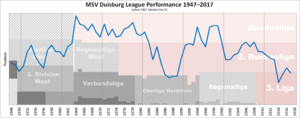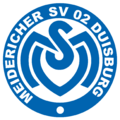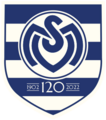MSV Duisburg facts for kids
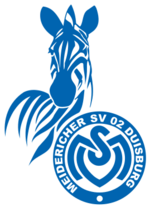 |
|||
| Full name | Meidericher Spielverein 02 e. V. Duisburg | ||
|---|---|---|---|
| Nickname(s) | Die Zebras (The Zebras) | ||
| Founded | 1902 | ||
| Ground | MSV-Arena | ||
| Capacity | 31,514 | ||
| Manager | Dietmar Hirsch | ||
|
|
|||
MSV Duisburg is a German football club from Duisburg, a city in North Rhine-Westphalia. The club is often called Die Zebras because of their striped jerseys, which look like a zebra's stripes. MSV Duisburg was one of the first teams to join the Bundesliga when it started in 1963. For the 2025–26 season, they are playing in the German 3. Liga.
Contents
History of MSV Duisburg
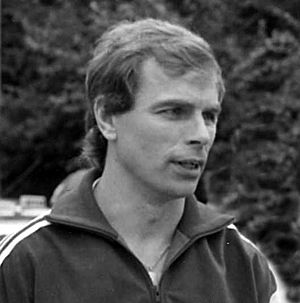
How the Club Started
The club began in 1902 as Meidericher Spielverein in a place called Meiderich, which later became part of Duisburg. In 1905, they joined with another club, Sportclub Viktoria Meiderich.
By 1910, MSV was playing in a top league in West Germany. In the 1913–14 season, they won every game, scoring 113 goals and letting in only 12! This helped them get promoted to the 'Zehnerliga', which was the highest level of football in West Germany at that time.
In 1929, they won their first Niederrhein championship. They were also second in the West German championship, which meant they could play in the national championship for the first time in 1930. They won the Niederrhein championship again in 1931 and 1932.
After World War II, in 1946, Meiderich became city champions. In 1949, they joined the new West German second division. The club moved up to the top league, Oberliga West, in 1951. Even though they were moved down in 1955, they quickly returned and stayed in the Oberliga West until the Bundesliga was created in 1963.
Joining the Bundesliga in the 1960s
It was a surprise when MSV Duisburg was chosen to be one of the first teams in the new national league, the Bundesliga, for its first season in 1963–64. Even though they weren't the most famous club or from a huge city, they were picked because they were the strongest team from the busy Lower Rhine region.
For their first Bundesliga season, the club hired a young coach named Rudi Gutendorf. He brought in World Cup winner Helmut Rahn. Gutendorf taught his team a special way to play where every player helped both in attack and defense. This style helped them finish second in the league, which is still their best-ever league result. They also let in the fewest goals that season.
In 1966, MSV Duisburg scored a club record of 70 goals in the league. They also had their biggest away win ever in the Bundesliga, beating Tasmania Berlin 9–0. That year, they also reached the DFB-Pokal final, but lost to Bayern Munich. After this season, in 1967, the club changed its name to MSV Duisburg, getting support from the city.
European Games and Moving Down Leagues (1970s, 1980s)
In 1976, MSV Duisburg played in the DFB-Pokal final again, but lost to Eintracht Frankfurt. Then, they played in the UEFA Cup for the first time, which is a big European competition. They were knocked out in the second round. During this time, their captain, Bernard Dietz, was a star player. He was even voted one of the best players in the league and later captained the German national team to win UEFA Euro 1980.
Duisburg did well in the league in 1976–77 and 1977–78, finishing 9th and 6th. This allowed them to play in the 1978–79 UEFA Cup again. They did great, beating teams like Lech Poznań and RC Strasbourg to reach the semi-finals! However, they lost to Borussia Mönchengladbach. Even with this European success, they almost got moved down from the Bundesliga that year. In the 1981–82 season, they were relegated from the Bundesliga for the first time.
Four years later, Duisburg was moved down again, finishing last in the 2. Bundesliga. They then spent three years in the third-tier league, Oberliga Nordrhein, before returning to the 2. Bundesliga in 1989. During this time, they also won the German amateur championship.
Moving Between Leagues (1990s, 2000s)
In 1991, Duisburg finished second in the 2. Bundesliga and returned to the Bundesliga after almost ten years. However, they were quickly moved down again. They became known as a "yo-yo" team, often moving between the top two leagues. In 1993, with former player Ewald Lienen as coach, they were promoted again. They even led the Bundesliga for a while as a newly promoted team, which was very unusual!
Friedhelm Funkel helped the club get back into the Bundesliga in 1996. They finished in the top half of the league for three years in a row and reached the 1998 DFB-Pokal final again, but lost to Bayern Munich. Duisburg also played in the 1998–99 UEFA Cup Winners' Cup, but were beaten by K.R.C. Genk. This was their last time playing in a European competition so far. In 2000, the club was relegated again.
A new stadium, the MSV-Arena, was finished in 2005. That same year, Duisburg was promoted back to the Bundesliga. However, they were moved down again in 2006, promoted in 2007, and then moved down again in 2008.
Recent Challenges (2010s, 2020s)
In 2011, MSV Duisburg surprisingly reached their fourth DFB-Pokal Final. They lost to Schalke 04.
After five years in the 2. Bundesliga, Duisburg was moved down to the 3. Liga in 2013. This happened because the league said the club had financial problems and couldn't get a license to play in the 2. Bundesliga.
Duisburg was promoted back to the 2. Bundesliga for the 2015–16 season, but only stayed for one year. They won the 3. Liga for the first time in 2016–17 and finished well in the 2. Bundesliga in 2017–18. But the next year, they were relegated back to the 3. Liga.
For the 2024–25 season, MSV Duisburg played in the fourth tier of German football, the Regionalliga West, for the first time in their history. They won the league and were immediately promoted back to the 3. Liga.
Recent Seasons Overview
| Year | Division | Tier | Position |
|---|---|---|---|
| 1963–64 | 1. Bundesliga | I | 2nd |
| 1964–65 | 1. Bundesliga | 7th | |
| 1965–66 | 1. Bundesliga | 8th | |
| 1966–67 | 1. Bundesliga | 11th | |
| 1967–68 | 1. Bundesliga | 7th | |
| 1968–69 | 1. Bundesliga | 12th | |
| 1969–70 | 1. Bundesliga | 15th | |
| 1970–71 | 1. Bundesliga | 7th | |
| 1971–72 | 1. Bundesliga | 14th | |
| 1972–73 | 1. Bundesliga | 10th | |
| 1973–74 | 1. Bundesliga | 15th | |
| 1974–75 | 1. Bundesliga | 14th | |
| 1975–76 | 1. Bundesliga | 10th | |
| 1976–77 | 1. Bundesliga | 9th | |
| 1977–78 | 1. Bundesliga | 6th | |
| 1978–79 | 1. Bundesliga | 13th | |
| 1979–80 | 1. Bundesliga | 14th | |
| 1980–81 | 1. Bundesliga | 12th | |
| 1981–82 | 1. Bundesliga | 18th ↓ | |
| 1982–83 | 2. Bundesliga | II | 11th |
| 1983–84 | 2. Bundesliga | 3rd | |
| 1984–85 | 2. Bundesliga | 13th | |
| 1985–86 | 2. Bundesliga | 20th ↓ | |
| 1986–87 | Oberliga Nordrhein | III | 2nd |
| 1987–88 | Oberliga Nordrhein | 1st | |
| 1988–89 | Oberliga Nordrhein | 1st ↑ | |
| 1989–90 | 2. Bundesliga | II | 10th |
| 1990–91 | 2. Bundesliga | 2nd ↑ | |
| 1991–92 | 1. Bundesliga | I | 19th ↓ |
| 1992–93 | 2. Bundesliga | II | 2nd ↑ |
| 1993–94 | 1. Bundesliga | I | 9th |
| 1994–95 | 1. Bundesliga | 17th ↓ | |
| 1995–96 | 2. Bundesliga | II | 3rd ↑ |
| 1996–97 | 1. Bundesliga | I | 9th |
| 1997–98 | 1. Bundesliga | 8th | |
| 1998–99 | 1. Bundesliga | 8th | |
| 1999–2000 | Bundesliga | 18th ↓ | |
| 2000–01 | 2. Bundesliga | II | 11th |
| 2001–02 | 2. Bundesliga | 11th | |
| 2002–03 | 2. Bundesliga | 8th | |
| 2003–04 | 2. Bundesliga | 7th | |
| 2004–05 | 2. Bundesliga | 2nd ↑ | |
| 2005–06 | Bundesliga | I | 18th ↓ |
| 2006–07 | 2. Bundesliga | II | 3rd ↑ |
| 2007–08 | Bundesliga | I | 18th ↓ |
| 2008–09 | 2. Bundesliga | II | 6th |
| 2009–10 | 2. Bundesliga | 6th | |
| 2010–11 | 2. Bundesliga | 8th | |
| 2011–12 | 2. Bundesliga | 10th | |
| 2012–13 | 2. Bundesliga | 11th ↓ | |
| 2013–14 | 3. Liga | III | 7th |
| 2014–15 | 3. Liga | 2nd ↑ | |
| 2015–16 | 2. Bundesliga | II | 16th ↓ |
| 2016–17 | 3. Liga | III | 1st ↑ |
| 2017–18 | 2. Bundesliga | II | 7th |
| 2018–19 | 2. Bundesliga | 18th ↓ | |
| 2019–20 | 3. Liga | III | 5th |
| 2020–21 | 3. Liga | 15th | |
| 2021–22 | 3. Liga | 15th | |
| 2022–23 | 3. Liga | 12th | |
| 2023–24 | 3. Liga | 18th ↓ | |
| 2024–25 | Regionalliga West | IV | 1st ↑ |
| 2025–26 | 3. Liga | III |
- Key
| ↑ Promoted | ↓ Relegated |
Club Achievements
MSV Duisburg has won several titles and reached many finals throughout its history:
League Titles
- Bundesliga
- Second place: 1963–64
- 2. Oberliga West (Second Division): 1950–51
- 3. Liga (Third Division): 2016–17
- Oberliga Nordrhein (Third Division): 1987–88, 1988–89
Cup Competitions
- DFB-Pokal (German Cup)
- Finalists: 1965–66, 1974–75, 1997–98, 2010–11
International Cups
- Intertoto Cup: 1974, 1977, 1978
Regional and Youth Titles
- Bezirksliga Niederrhein (Top Regional League): 1928–29, 1930–31, 1931–32
- Lower Rhine Cup (Regional Cup): 1988–89, 2013–14, 2016–17
- German amateur championship (Third Division): 1986–87
- German Under 19 championship: 1971–72, 1976–77, 1977–78
Current Team Players
|
|
Players on Loan
|
|
Club Managers Through the Years
 Hermann Lindemann (1955–1957)
Hermann Lindemann (1955–1957) Rudi Gutendorf (1963–1965)
Rudi Gutendorf (1963–1965) Wilhelm Schmidt (1965)
Wilhelm Schmidt (1965) Hermann Eppenhoff (1965–1967)
Hermann Eppenhoff (1965–1967) Gyula Lóránt (1967–1968)
Gyula Lóránt (1967–1968) Robert Gebhardt (1968–1970)
Robert Gebhardt (1968–1970) Rudolf Fassnacht (1970–1973)
Rudolf Fassnacht (1970–1973) Willibert Kremer (1973–1976)
Willibert Kremer (1973–1976) Rolf Schafstall (1976)
Rolf Schafstall (1976) Otto Knefler (1976–1977)
Otto Knefler (1976–1977) Carl-Heinz Rühl (1977–1978)
Carl-Heinz Rühl (1977–1978) Rolf Schafstall (1978–1979)
Rolf Schafstall (1978–1979) Heinz Höher (1979–1980)
Heinz Höher (1979–1980) Friedhelm Wenzlaff (1980–1981)
Friedhelm Wenzlaff (1980–1981) Kuno Klötzer (1981–1982)
Kuno Klötzer (1981–1982) Siegfried Melzig (1982–1983)
Siegfried Melzig (1982–1983) Luis Zacarías (1983–1985)
Luis Zacarías (1983–1985) Günter Preuß (1985)
Günter Preuß (1985) Helmut Witte (1985–1986)
Helmut Witte (1985–1986) Friedhelm Vos (1986)
Friedhelm Vos (1986) Detlef Pirsig (1986–1989)
Detlef Pirsig (1986–1989) Willibert Kremer (1989–1992)
Willibert Kremer (1989–1992) Uwe Reinders (1992–1993)
Uwe Reinders (1992–1993) Ewald Lienen (1993–1994)
Ewald Lienen (1993–1994) Hans Bongartz (1994–1996)
Hans Bongartz (1994–1996) Friedhelm Funkel (1996–2000)
Friedhelm Funkel (1996–2000) Josef Eichkorn (2000)
Josef Eichkorn (2000) Wolfgang Frank (2000)
Wolfgang Frank (2000) Josef Eichkorn (2000–2001)
Josef Eichkorn (2000–2001) Pierre Littbarski (2001–2002)
Pierre Littbarski (2001–2002) Bernard Dietz (2002–2003, caretaker)
Bernard Dietz (2002–2003, caretaker) Norbert Meier (2003–2005)
Norbert Meier (2003–2005) Heiko Scholz (2005, caretaker)
Heiko Scholz (2005, caretaker) Jürgen Kohler (2006)
Jürgen Kohler (2006) Heiko Scholz (2006, caretaker)
Heiko Scholz (2006, caretaker) Rudi Bommer (2006–2008)
Rudi Bommer (2006–2008) Heiko Scholz (2008, caretaker)
Heiko Scholz (2008, caretaker) Peter Neururer (2008–2009)
Peter Neururer (2008–2009) Uwe Speidel (2009, caretaker)
Uwe Speidel (2009, caretaker) Milan Šašić (2009–2011)
Milan Šašić (2009–2011) Oliver Reck (2011–2012)
Oliver Reck (2011–2012) Ivica Grlić (2012, caretaker)
Ivica Grlić (2012, caretaker) Kosta Runjaić (2012–2013)
Kosta Runjaić (2012–2013) Karsten Baumann (2013–2014)
Karsten Baumann (2013–2014) Gino Lettieri (2014–2015)
Gino Lettieri (2014–2015) Iliya Gruev (2015–2018)
Iliya Gruev (2015–2018) Torsten Lieberknecht (2018–2020)
Torsten Lieberknecht (2018–2020) Gino Lettieri (2020–2021)
Gino Lettieri (2020–2021) Uwe Schubert (2021, caretaker)
Uwe Schubert (2021, caretaker) Pavel Dochev (2021)
Pavel Dochev (2021) Uwe Schubert (2021, caretaker)
Uwe Schubert (2021, caretaker) Hagen Schmidt (2021–2022)
Hagen Schmidt (2021–2022) Torsten Ziegner (2022–2023)
Torsten Ziegner (2022–2023) Engin Vural (2023)
Engin Vural (2023) Boris Schommers (2023–2024)
Boris Schommers (2023–2024) Uwe Schubert (2024, caretaker)
Uwe Schubert (2024, caretaker) Dietmar Hirsch (2024–)
Dietmar Hirsch (2024–)
Women's Football Team
MSV Duisburg also has a women's football section. You can find more information about them at MSV Duisburg (women).
Club Culture and Mascot
The club's mascot is a Zebra, which comes from their nickname Die Zebras. The mascot is named 'Ennatz', after the famous club player Bernard Dietz.
As of 2022, the club has 8,638 members who support the team.
Images for kids
See also
 In Spanish: MSV Duisburgo para niños
In Spanish: MSV Duisburgo para niños
 | Claudette Colvin |
 | Myrlie Evers-Williams |
 | Alberta Odell Jones |


